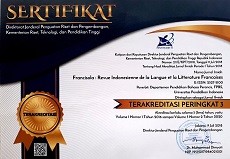MULTILINGUAL INTERACTIONS IN A COLLABORATIVE SITUATION: THE EXAMPLE OF HIGH SCHOOL STUDENTS IN ST. MARTIN
Abstract
RÉSUMÉ. Cet article vise à rendre compte de pratiques bilingues (anglais et français) d’élèves saint-martinois en situation collaborative afin d’enrichir le débat sur les langues et les savoirs. Cette recherche s’appuie sur deux corpus constitués d’interactions entre lycéens lors de séances de soutien scolaire, et étudiés selon l’analyse conversationnelle. Croisant modalité collaborative et didactique du bilinguisme, l’étude modélise la gestion des ressources langagières au regard des savoirs et des savoir-faire mobilisés durant l’interaction. Elle vise ainsi à établir en quoi, à quelles conditions et par quels mécanismes les interactions entre les deux langues interviennent dans la construction de compétences cognitives scolaires.
Mots-clés: alternances de langues, compétences, collaboration, didactique du bilinguisme.
00lns:o="urn:schemas-microsoft-com:office:office" xmlns:w="urn:schemas-microsoft-com:office:word" xmlns:m="http://schemas.microsoft.com/office/2004/12/omml" xmlns="http://www.w3.org/TR/REC-html40">
ABSTRACT. This article aims to explore the bilingual practices (English and French) used by students from St Martin in a collaborative situation, in order to enrich the debate on languages and knowledge. This research is based on two corpora consisting of interactions between high school pupils during their educational support sessions, and which are studied using conversational analysis; the study uses this combination of collaborative methods and bilingual education to model the management of linguistic resources with regard to the factual knowledge and practical skills brought into play during the interaction. The challenge of this study is therefore to establish what is involved, and under which conditions and through which mechanisms the interactions between two languages (English and French) may contribute to the construction of cognitive learning skills.
Keywords: bilinguism and teaching methods, code-switching, collaborative learning, learning skills.
Full Text:
PDFReferences
Anciaux, A., Forissier, T., & Prudent, L.-F. (2013). Contextualisation didactique, approches théoriques. Paris: L’Harmattan.
Causa, M. (2011). L'alternance des langues dans l'enseignement bilingue. In J. Duverger (Ed.), Enseignement bilingue. Le professeur de « disciplines non linguistiques ». Statut, fonctions, pratiques pédagogiques (p. 60-63). Paris: ADEB.
ICOR (2006). Conventions de transcription. Retrieved from http://icar.univ-lyon2.fr/projets/corinte/bandeau_droit/convention_icor.htm
Johnson, D. W., & Johnson, R.-T. (1999). Learning together and alone: Cooperative, competitive and individualistic learning (5th ed.). Upper Saddle River, NJ: Allyn and Bacon.
Mattar, C., & Blondin, C. (2006, December). Apprentissage coopératif et prises de parole en langue cible dans deux classes d’immersion. La Revue canadienne des langues vivantes, 63(2), 225-253.
Pochon-Berger, E. (2010). La compétence d’interaction en L2 : gestion de la cohérence interactive par des apprenants du French. Doctoral thesis, Switzerland: University of Neuchâtel.
Sensevy, G. (2011). Le sens du savoir. Éléments pour une théorie de l’action conjointe en didactique. Brussels: De Boeck.
DOI: https://doi.org/10.17509/francisola.v1i1.2564
Refbacks
- There are currently no refbacks.
Copyright (c) 2016 FRANCISOLA
View My Stats










